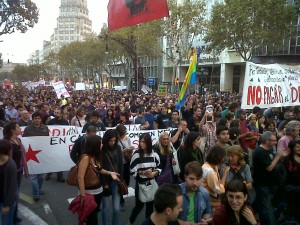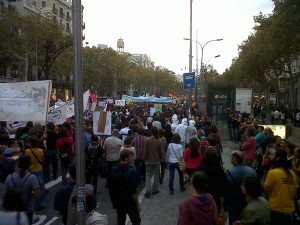Last night I was walking through Barcelona, and accidentally stumbled upon the local “Occupy” march, and I must say it was quite impressive. Now, there is never any shortage of protests going on in Spain, whether in Puerta del Sol in Madrid or along the Passeig de Gracia in Barcelona (and they have had their own social movement, modeled on the Arab Spring, going strong since around May). But usually, compared to the “real” protests I got to enjoy when I was living in Korea, the ones in Spain seem pretty minor. The march of crowds coming to and going from Camp Nou for each Barca football home game is far larger (and rowdier).
But Occupy Barcelona was different. Or October 15 Barcelona, I guess I should call it. For one, it was a lot bigger — police say 60,000 marched, activists say around 400,000. But it certainly felt big. People marched from Placa Catalunya, up Passeig de Gracia, then down Arago to Sant Joan, then to the Arc de Triomf and Parc Ciutadella. They were orderly and good-natured, and a pretty wide mix of ages and social groups. Seeing grandmothers marching with V for Vendetta masks is pretty striking (I wish I had taken a picture of them, but sadly I did not).
The nature of Occupy Barcelona is a bit different than Occupy Wall Street, which is natural, considering that the Spanish economy is quite different than America’s. Unemployment is huge here — 21%. They actually do need some business-minded reforms. Basically, a huge property bubble that ran from the late 1990s until about 2008 (thanks to cheap money from the Euro) led many here to think they were living in a German-sized economy. The readjusting to reality has been pretty ugly for most of the country.
That said, though, I think the Occupy movement has a role to play here, too. Like America, a big reason for the property bubble was bank-business-government collusion, a distortion of the basic social contract that needs to be fixed.
In sports, no one likes the referees, but we know that referees are needed for the sake of the game. Wanting to fix the rules and support the referees doesn’t mean we are anti-football or anti-basketball (or whatever). We love our sports, we just want them played fairly and well. I think that is the core of what the Occupy movement is about. Most people are not anti-business, but we are seeing something essentially unfair and broken that needs fixing.





Leave a Reply